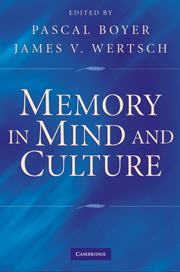Book contents
- Frontmatter
- Contents
- List of Contributors
- PART I IN MIND, CULTURE, AND HISTORY: A SPECIAL PERSPECTIVE
- PART II HOW DO MEMORIES CONSTRUCT OUR PAST?
- PART III HOW DO WE BUILD SHARED COLLECTIVE MEMORIES?
- 5 Collective Memory
- 6 The Role of Repeated Retrieval in Shaping Collective Memory
- 7 Making History: Social and Psychological Processes Underlying Collective Memory
- 8 How Does Collective Memory Create a Sense of the Collective?
- PART IV HOW DOES MEMORY SHAPE HISTORY?
- PART V HOW DOES MEMORY SHAPE CULTURE?
- Index
- References
8 - How Does Collective Memory Create a Sense of the Collective?
Social and Psychological Processes Underlying Collective Memory
Published online by Cambridge University Press: 05 June 2012
- Frontmatter
- Contents
- List of Contributors
- PART I IN MIND, CULTURE, AND HISTORY: A SPECIAL PERSPECTIVE
- PART II HOW DO MEMORIES CONSTRUCT OUR PAST?
- PART III HOW DO WE BUILD SHARED COLLECTIVE MEMORIES?
- 5 Collective Memory
- 6 The Role of Repeated Retrieval in Shaping Collective Memory
- 7 Making History: Social and Psychological Processes Underlying Collective Memory
- 8 How Does Collective Memory Create a Sense of the Collective?
- PART IV HOW DOES MEMORY SHAPE HISTORY?
- PART V HOW DOES MEMORY SHAPE CULTURE?
- Index
- References
Summary
Where were you when you first heard about the 9/11 attacks? Do you remember what you were doing at the time? How did you feel when you first heard the news, and how does thinking about this event make you feel now? As of this writing, many Americans over the age of 15 most likely find these questions remarkably easy to answer. The fact that a singular event in history could be remembered so well, and by so many people, is relevant to at least two lines of research in the memory literature.
First, the very fact that people can answer such questions so easily is relevant to research and theory on “flashbulb memories” (Brown & Kulik, 1977; Kvavilashvili, Mirani, Schlagman, & Kornbrot, 2004; Sharot, Martorella, Delgado, & Phelps, 2006). As originally conceptualized, flashbulb memories were regarded as extraordinarily detailed, long-lasting, and unusually accurate “snapshots” of the specific context in which an unexpected, emotion-laden event occurred (Brown & Kulik, 1977). Over the years, research has qualified some of the early claims regarding such memories. For example, even though people often perceive that such memories are accurate, such recollections can contain the same sorts of distortions one finds with other types of memories (Neisser & Harsch, 1992). Nevertheless, more recent work has found that flashbulb memories can sometimes be extraordinarily accurate and detailed, provided that the event has direct, personal relevance to the perceiver (Bernsten & Thomsen, 2005).
Information
- Type
- Chapter
- Information
- Memory in Mind and Culture , pp. 194 - 218Publisher: Cambridge University PressPrint publication year: 2009
References
Accessibility standard: Unknown
Why this information is here
This section outlines the accessibility features of this content - including support for screen readers, full keyboard navigation and high-contrast display options. This may not be relevant for you.Accessibility Information
- 14
- Cited by
